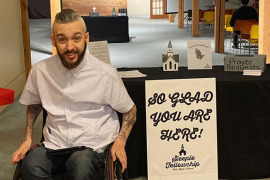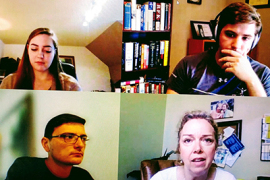Here's How Christians Can Use Pop Culture to Engage the World With Gospel
Movies, documentaries, and television shows are powerful mediums that can affect emotion, change belief systems, and spark meaningful discussion. For Christians, pop culture provides endless opportunities to engage people with the hope of the Gospel.
“I think it’s really important that we, as Christian thinkers and budding apologists, remain very attentive to what’s going on around us in our culture and to use the opportunity that pop culture provides us to generate important conversations and to build bridges,” says Dr. David Baggett, author and professor at Liberty University’s Rawlings School of Divinity.
Films don’t need to be overtly Christian to include important truths that point us to God, Dr. Baggett contends. From Man in the High Castle to Lord of the Rings, many mainstream films and TV series are chock-full of biblical themes and imagery that generate conversations about faith and spirituality.
“There might not be anything overtly Christian in a particular show, but if Christianity is true —, and I believe wholeheartedly it is —, it would make perfect sense that there are going to be truths in various expressions of pop culture that deeply accord and resonate with the deliverances of Christianity,” he says. “To take advantage of that opportunity is wise and a great strategy.”
As society pulls further away from Christian principles and apathy toward religion heightens, Christians are tasked with finding unique and disarming ways to share the Gospel. Instead of shying away from pop culture, Dr. Baggett encourages believers to use it to find commonality and instill in others a desire to know God.
“There’s a real opportunity for us as Christian apologists,” he said. “Let’s take a look at popular culture. Let’s see what truths are revealed in shows that people of all stripes, of all belief systems, are flocking to. Let’s take advantage of the opportunity that it gives us to generate conversations about substantive topics revolving around these pieces of pop culture that so many of us appreciate.”
In his classes at Liberty University, Dr. Baggett teaches his students to look at every aspect of culture through the lens of moral apologetics. All around us are important truths that point us to God, he argues — we just need to develop the eyes to see them.
“I emphasize [to my students] the need to be attentive to the possibilities that are out there,” he says. “If it’s moral apologetics, in particular, look at those shows that might discuss our moral obligations or shows that accentuate moral dignity and human value and matters like that. And then, maybe gently point this out to your friends who might not be believers.”
Films and television shows are particularly effective tools to generate discourse, he explains, because they provide the viewer with a wholly immersive experience.
“There needs to be some kind of transcendent, stable, objective value there, and in a fictional context, you can often viscerally experience that, and it becomes practically non-negotiable,” he explains. “You’re like, ‘Well, of course this has to be true,’ but then a little bit of additional reflection can be encouraged at that point and you can say, ‘If that’s the case, what is the account of objective human value? What is the account of objective moral obligations that are authoritative for us?’ Questions like that.”
Dr. Baggett encourages his students to think critically about cultural issues, communicate effectively, and ask thoughtful questions, allowing them to meaningfully engage others for the cause of Christ.
“Some of my best students have been very effective in building bridges and building the medium of popular culture to generate those substantive conversations,” he says. “It’s always a thrill to be able to see them do that. It’s a very effective way to make a connection with those outside of the church who may not understand the theological lingo, but they can be gently introduced to important concepts that, if we think about them long enough, will serve as an effective prelude to a proclamation of the Gospel.”
Related:
Called to Counseling — Do You Need a License to Make a Difference?
>>>Request for Liberty University Online degree info now.





